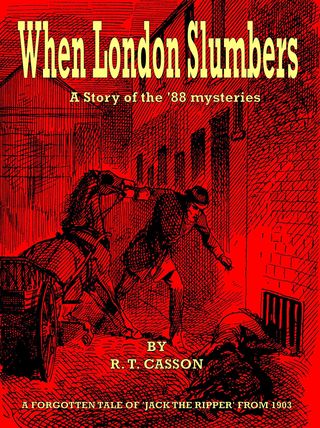Attention
Lost Ripper Novel Reclaimed
A tale penned 14 years after the Ripper murders has been repackaged.
Posted November 12, 2018

One hundred and thirty years ago last week, the last of Jack the Ripper’s “official” victims was discovered murdered (although many Ripperologists disagree that the spree ended on November 8-9, 1888). Mary Jane Kelly had been killed and grossly mutilated in a rented room in London’s Whitechapel neighborhood. Hundreds of books have been devoted to the Ripper case, with over 300 suspects proposed. However, few books were published close to the time of the crimes. Some were fiction.
In another blog, I discussed an early tale based on the murders attributed to the Ripper. It was called The Lodger, written by Marie Belloc Lowndes. She published it as a short story in the January 1911 in McClure’s Magazine before lengthening it into a novella.
An anecdote she’d heard at a dinner party had inspired the story. Apparently, an elderly couple had suspected that Jack the Ripper had lodged with them around the time when the murders were happening. Lowndes had followed the sensational news coverage, so the idea of landlords trying to decide whether their eccentric lodger is a killer appealed to her. She turned it into a richly psychological narrative by pitting economic need against moral imperative.
Another novel from just after the Ripper’s era was recently discovered by Robert Clack and republished by Secret Chamber Publishing. When London Slumbers is from 1903, first serialized anonymously in The Red Letter. Then “R. T. Casson” republished it in 1907 in The Preston Herald.
Although the publisher “guarantees” that this story will hold the reader’s attention, I lean more toward Clack’s opinion. Here’s what he wrote on a Ripper Forum last year as he affirmed the impending publication:
“Transcribing it wasn't easy[,] as it has to be one of the worst written stories I have ever read. It is also badly punctuated. It is, however, an interesting story and worth a read. While I won’t be changing the text, except for a couple of names, which are quite obviously wrong.”
He had to correct a considerable number of grammatical errors. In a note in the book, he reiterates that it is not well written, as it relies too much on coincidence for plot momentum.
That wasn’t motivating. Although it’s not “the worst written story” I’ve come across, the characters seemed to be part of a predictable melodrama. Points of view kept shifting abruptly, making it hard to read. In addition, I didn’t care about anyone. But since this tale seems to provide a fictional backstory for one of the actual Ripper suspects, I stayed with it.
The violence to Ripper victims was mostly buffered. One character hears a police whistle on the night of the “double event,” but we don’t get to be a fly on the wall. Instead, he looks for cover. Most of the Ripper’s deadly work is learned via gossip as people gather, post-murder, to discuss rewards and offer theories. It adds little tension, aside from characters acting suspiciously, but we do feel the rise and fall of concern for safety as police fumble about and the press gains and loses interest. Along the way, other crimes are explored and a romance blossoms, but not all Ripper-related mysteries are solved.
Still, the fact that this novel was published so soon after the Ripper murders offers a sense of the time period, with its lodging houses, sensational press, and hunger for news. The author claims to have had the opportunity to obtain confidential information not released to the public.
Students of Ripperology or writers who hope to set their own fiction in this era will want to add this novel to their collection, I doubt that other audiences will be engaged. For atmosphere and plot, The Lodger is a much better story.
References
Casson, R. T. (2018). When London slumbers. London: Secret Chamber Publishing (orig 1903, 1907).


